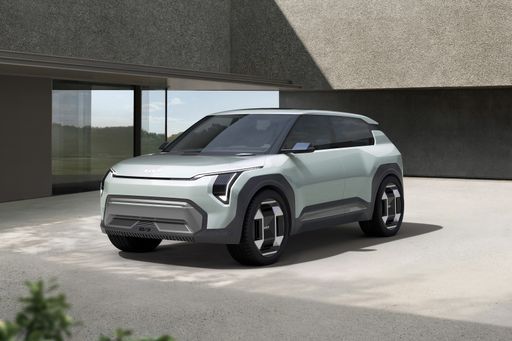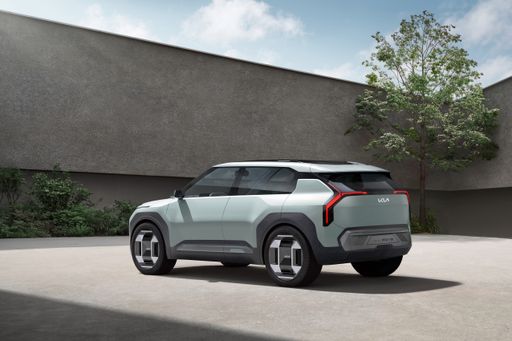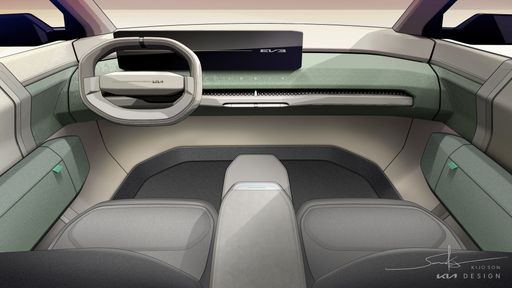Hyundai Tucson vs Kia EV3 - Differences and prices compared
Compare performance (288 HP vs 204 HP), boot space and price (20900 £ vs 30800 £ ) at a glance. Find out which car is the better choice for you – Hyundai Tucson or Kia EV3?
Costs and Efficiency:
Looking at overall running costs, both models reveal some interesting differences in everyday economy.
Hyundai Tucson has a convincingly advantage in terms of price – it starts at 20900 £ , while the Kia EV3 costs 30800 £ . That’s a price difference of around 9951 £.
As for electric range, the Kia EV3 performs decisively better – achieving up to 605 km, about 535 km more than the Hyundai Tucson.
Engine and Performance:
Power, torque and acceleration are the classic benchmarks for car enthusiasts – and here, some clear differences start to show.
When it comes to engine power, the Hyundai Tucson has a noticeable edge – offering 288 HP compared to 204 HP. That’s roughly 84 HP more horsepower.
Both models accelerate almost equally fast – 7.50 s from 0 to 100 km/h.
In terms of top speed, the Hyundai Tucson performs somewhat better – reaching 204 km/h, while the Kia EV3 tops out at 170 km/h. The difference is around 34 km/h.
There’s also a difference in torque: Hyundai Tucson pulls distinct stronger with 379 Nm compared to 283 Nm. That’s about 96 Nm difference.
Space and Everyday Use:
Cabin size, boot volume and payload all play a role in everyday practicality. Here, comfort and flexibility make the difference.
Both vehicles offer seating for 5 people.
In curb weight, Hyundai Tucson is a bit lighter – 1542 kg compared to 1800 kg. The difference is around 258 kg.
In terms of boot space, the Hyundai Tucson offers distinct more room – 620 L compared to 460 L. That’s a difference of about 160 L.
In maximum load capacity, the Hyundai Tucson performs clearly perceptible better – up to 1799 L, which is about 548 L more than the Kia EV3.
When it comes to payload, Hyundai Tucson slightly takes the win – 545 kg compared to 470 kg. That’s a difference of about 75 kg.
Who wins the race in the data check?
The Hyundai Tucson holds a solid overall lead in the objective data comparison.
This result only shows which model scores more points on paper – not which of the two cars feels right for you.
Costs and Consumption
View detailed analysis
Engine and Performance
View detailed analysis
Dimensions and Body
View detailed analysis

Hyundai Tucson
Hyundai Tucson
Hyundai Tucson marries bold, sculpted looks with a clever, roomy cabin that feels smarter than its price tag suggests. It's composed on the road, easy to live with day-to-day, and a sensible choice for buyers who want SUV style without the showroom theatrics.
details




Kia EV3
The Kia EV3 arrives as a cheeky, practical electric compact that manages to feel both premium and playful, delivering crisp handling and a roomy cabin that's perfect for urban life. With smart tech, friendly styling and sensible pricing, the EV3 is the kind of car that makes switching to electric feel like a no-brainer without asking you to give anything important up.
details


Costs and Consumption |
|
|---|---|
|
Price
20900 - 47900 £
|
Price
30800 - 41700 £
|
|
Consumption L/100km
2.7 - 7.6 L
|
Consumption L/100km
-
|
|
Consumption kWh/100km
-
|
Consumption kWh/100km
14.9 - 16.2 kWh
|
|
Electric Range
63 - 70 km
|
Electric Range
436 - 605 km
|
|
Battery Capacity
-
|
Battery Capacity
58.3 - 81.4 kWh
|
|
co2
62 - 172 g/km
|
co2
0 g/km
|
|
Fuel tank capacity
52 - 54 L
|
Fuel tank capacity
-
|
Dimensions and Body |
|
|---|---|
|
Body Type
SUV
|
Body Type
SUV
|
|
Seats
5
|
Seats
5
|
|
Doors
5
|
Doors
5
|
|
Curb weight
1542 - 1893 kg
|
Curb weight
1800 - 1885 kg
|
|
Trunk capacity
546 - 620 L
|
Trunk capacity
460 L
|
|
Length
4525 - 4535 mm
|
Length
4300 - 4310 mm
|
|
Width
1865 mm
|
Width
1850 mm
|
|
Height
1650 mm
|
Height
1560 - 1570 mm
|
|
Max trunk capacity
1795 - 1799 L
|
Max trunk capacity
1251 L
|
|
Payload
518 - 545 kg
|
Payload
470 kg
|
Engine and Performance |
|
|---|---|
|
Engine Type
Petrol, Full Hybrid, Plugin Hybrid, Diesel MHEV
|
Engine Type
Electric
|
|
Transmission
Manuel, Automatic
|
Transmission
Automatic
|
|
Transmission Detail
Manual Gearbox, Dual-Clutch Automatic, Automatic Gearbox
|
Transmission Detail
Reduction Gearbox
|
|
Drive Type
Front-Wheel Drive, All-Wheel Drive
|
Drive Type
Front-Wheel Drive
|
|
Power HP
136 - 288 HP
|
Power HP
204 HP
|
|
Acceleration 0-100km/h
7.5 - 11.6 s
|
Acceleration 0-100km/h
7.5 - 7.9 s
|
|
Max Speed
196 - 204 km/h
|
Max Speed
170 km/h
|
|
Torque
250 - 379 Nm
|
Torque
283 Nm
|
|
Number of Cylinders
4
|
Number of Cylinders
-
|
|
Power kW
100 - 212 kW
|
Power kW
150 kW
|
|
Engine capacity
1598 cm3
|
Engine capacity
-
|
General |
|
|---|---|
|
Model Year
2025
|
Model Year
2024
|
|
CO2 Efficiency Class
F, D, E, B
|
CO2 Efficiency Class
A
|
|
Brand
Hyundai
|
Brand
Kia
|
What drive types are available for the Hyundai Tucson?
Available configurations include Front-Wheel Drive or All-Wheel Drive.




